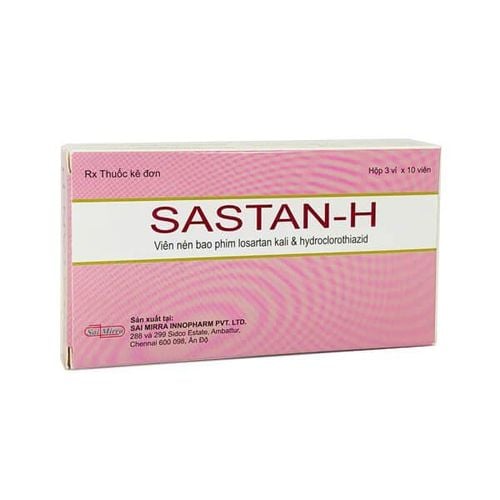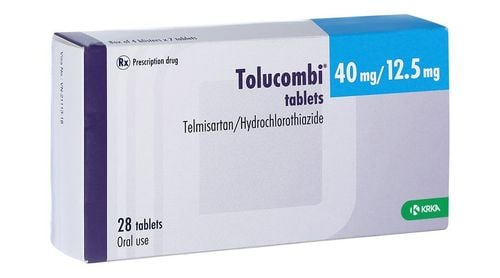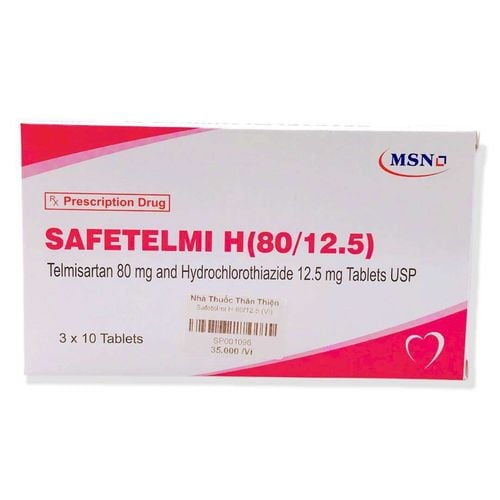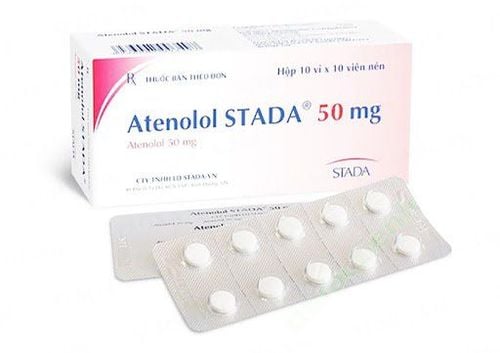This is an automatically translated article.
Ebitac 25 has the main ingredient Enalapril maleate 10mg; Hydrochlorothiazide 25mg is indicated for the treatment of hypertension and patients with congestive heart failure, helping to reduce the risk of death and complications. To ensure effective use, patients need to take the drug according to the prescription or consult a doctor, a specialist pharmacist.
1. What is the composition of Ebitac blood pressure medicine?
Ebitac 25 is produced from Farmak JSC, is made in the form of tablets with the packing specification is box of 2 blisters x 10 tablets.
Ingredients in each tablet of the drug include:
Enalapril Maleate 10 mg. Hydrochlorothiazide 25mg. Excipients 1 capsule. The effect of the main ingredients in the formula of the drug is:
Active ingredient Enalapril Maleate when entering the body is converted into Enalapril. They have the ability to inhibit the Renin - Angiotensin - Aldosteron system through the angiotensin converting enzyme, thereby causing the effect of lowering blood pressure. In addition, Enalapril also helps the body reduce sodium retention, while inhibiting Bradykinin breakdown, increasing Kallikrein - Kinin vasodilation. Hydrochlorothiazide belongs to the group of Thiazide diuretics, which work to increase salt excretion and reduce reabsorption. Carbonic Anhydrase activity is reduced, so the excretion of Bicarbonate is increased. Accordingly, this active ingredient will not change the urine pH, so it can be combined with drugs to treat high blood pressure to increase the antihypertensive effect.
2. In what cases is Ebitac prescribed for blood pressure medicine?
2.1. Indications Ebitac Thanks to the above active ingredients, Ebitac is indicated in the following cases:
High blood pressure. Heart failure (complicated heart failure, uncomplicated left ventricular dysfunction). 2.2.Contraindications to the drug Ebitac is contraindicated in the following cases:
Patients with hypersensitivity to any component of the drug or used drugs derived from Sulfonamide. Patients with gout, severe diabetes. Patients with renal artery stenosis. Aortic valve stenosis, people with severe obstructive cardiomyopathy. Pre-existing hypotension. Anuria, severe renal failure. Porphyrin metabolism disorders. Pregnant women ≥ 4 months. History of angioedema associated with ACE inhibitors. Hereditary angioedema, idiopathic.
3. How to take Ebitac
3.1. How to use Ebitac Patients need to take the tablet whole with a full glass of water. Patients should pay attention not to break, chew or crush the tablet.
The time to take the drug can be in the morning or in the evening. However, the patient should take the medicine at the same time each day to avoid forgetting it.
3.2. Dosage of Ebitac The patient should strictly follow the instructions of the doctor or refer to the following dosage:
Dosage for treatment of hypertension: Take 1 tablet per day. If necessary, can increase to 2 tablets/day.
Dosage with diuretics: Stop taking diuretics 2-3 days before treatment with Ebitac 25.
Treatment dose for patients with renal failure:
CC from 30 - 80 ml/min: Use immediately after quantifying the ingredients in the drug. If using the drug for 4 weeks but the patient has no clinical improvement, increase the dose or use another alternative medicine as prescribed by the doctor. Treatment dose for patients with heart failure:
Initial dose of 2.5 mg Enalapril each time for 3 days and increase to 2 times / day for the next 4 days. Maintenance dose of 2 tablets/day, can be increased to 4 tablets/day and adjusted within 2-4 weeks. Dosage for patients with asymptomatic left ventricular failure:
Initial dose: 2.5 mg Enalapril/time, 2 times/day. Increase the therapeutic dose gradually until taking 2 Ebitac 25 tablets per day.
4. How to deal with missed dose, overdose of Ebitac
4.1. How to handle when you miss a dose of Ebitac In case you forget a dose of Ebitac, you can take it as soon as you remember it. If it is almost time for the next dose, take the next dose as usual and do not double the dose on your own.
4.2. How to treat an overdose of Ebitac? In case the patient uses an overdose of the drug, it can cause severe hypotension, diuresis causing dehydration, electrolyte imbalance.
In this case, the patient should be treated as follows:
If abnormal symptoms appear, the patient should immediately contact a doctor or pharmacist for advice. Patients need to stop taking the drug and treat symptomatically and support recovery. Overdose can be managed by induction of vomiting, gastric lavage, hydration and electrolytes, and hemodialysis can also remove the drug.
5. Undesirable effects of the drug Ebitac
During treatment with Ebitac, patients may experience some of the following side effects:
Common effects: Headache, dizziness, sleep disturbance, sensitivity, diarrhea, nausea, angioedema, orthostatic hypotension, tachycardia, palpitations, rash, dry cough, renal failure. Uncommon effects: Reduces Hemoglobin, Hematocrit, neutrophils, granulocytes, Proteinuria, severe depression, agitation. Rare effects: Pancreatitis, cholestatic hepatitis, hypersensitivity, nasal congestion, intestinal obstruction, asthma, myalgia, blurred vision. Patients should immediately notify the doctor about the side effects encountered so that they can take measures to treat and handle when necessary.
6. Ebitac drug interactions
Ebitac can cause some of the following interactions:
Vasodilator, anesthetic, hypotensive, diuretic, Renin-releasing: The blood pressure lowering effect can be excessive and dangerous for the patient. Therefore, patients need to be closely monitored and dose adjustment in combination therapy. Drugs to increase blood potassium : The amount of potassium in the blood may be higher than normal, especially in patients with kidney failure. Accordingly, potassium levels should be regularly monitored during treatment. Lithium: increases accumulation in the body, so patients are prone to side effects and drug poisoning. Sympathomimetic bronchodilators, NSAIDs: Concomitant use may reduce the ability to lower blood pressure, as well as the diuretic of the drug. Contraceptives: increased risk of vascular damage, greater blood pressure disturbances when both drugs are used concurrently. Alcohol, Barbiturates: Interaction with the active ingredient Hydrochlorothiazide causes orthostatic hypotension. Antidiabetic drugs: Increases serum glucose concentration. Dose adjustment is required if they must be used together. Corticosteroids, ACTH: The synergistic effect of electrolyte imbalance, besides the amount of potassium in the blood can be severely reduced. Anticoagulants, drugs to treat gout, Amines to increase blood pressure have decreased response. In contrast, the effect of muscle relaxants, Glycosides, and Vitamin D will increase. Therefore, extreme caution should be exercised in combination therapy. Quinidine: Increases the likelihood of experiencing symptoms of torsades de pointes, ventricular fibrillation. In severe cases can cause death. Cholestyramine resin, Colestipol may reduce the absorption of Hydrochlorothiazide in the gastrointestinal tract. Patients should inform the doctor or pharmacist about the drugs, functional foods, herbs being used to have the best treatment and avoid causing side effects.
7. Note when using medicine and how to store Ebitac
During the use of Ebitac, the patient should pay attention:
Pregnant women: Ebitac can cause birth defects in the fetus, stillbirth. Therefore, if pregnancy is detected, the patient should stop taking the drug immediately. Lactation: Ebitac may be excreted in human milk, but the effects on the neonate are relatively low. Therefore, weigh the benefits and risks of the drug to the mother and child. It is best to consult a doctor before use. People who drive and operate machines: There is not enough information available on the effects of Ebitac on the ability to drive and use machines. However, the drug can also cause dizziness, drowsiness, insomnia, so it should be used with extreme caution. People with a history of heart disease, kidney failure, gout should be closely monitored before treatment. Patients with renal artery stenosis should have their blood creatinine measured before taking Ebitac. Elderly people are at higher risk of electrolyte disturbances when treated with this drug. In addition to the above notes, before using the drug, patients should carefully read the instructions before use. Currently, the safety and effectiveness of Ebitac when used in adolescents under 18 years of age have not been clearly established. Therefore, the drug should not be used for this subject.
To ensure the best drug quality, Ebitac should be stored in a dry place, the temperature is below 30 degrees Celsius, protected from light. Keep out of reach of children. children and pets.
In summary, Ebitac 25 has the main ingredient Enalapril maleate 10mg; Hydrochlorothiazide 25mg is indicated for the treatment of hypertension and patients with congestive heart failure, helping to reduce the risk of death and complications. To ensure effective use, patients need to use the drug according to the prescription or consult a doctor, professional pharmacist.
Follow Vinmec International General Hospital website to get more health, nutrition and beauty information to protect the health of yourself and your loved ones in your family.
Please dial HOTLINE for more information or register for an appointment HERE. Download MyVinmec app to make appointments faster and to manage your bookings easily.













